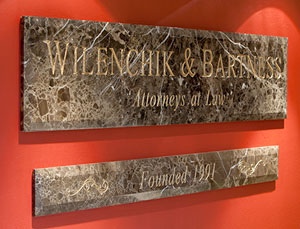WB Title Insurance Case Reaches Arizona Supreme Court
July 20, 2016 - WB finds itself in the thick of things when it comes to establishing new law in Arizona on the calculation of damages for claims against a title insurer for the diminution of value of property caused by an existing defect in the title that the insurer failed to discover. WB has been either directly or tangentially involved in three different cases on this issue, one of which has resulted in a published opinion from the Arizona Supreme Court and another in which the Ninth Circuit Court of Appeals has certified specific questions to the Arizona Supreme Court.
WB's involvement in this area started in 2008, when it brought an action against First American Title Insurance Company ("FATCO") for its bad-faith refusal to pay insured property owners for damages arising from FATCO's failure to recognize and disclose that the properties purchased by its insureds for commercial development were encumbered by residential CC&Rs that made it effectively impossible for the buyers to use the properties for their intended purpose. This case was entitled Troon Pad H, et al. v. FATCO.
In 2011, WB obtained a judgment of almost $2 million against FATCO in the Troon v. FATCO lawsuit after establishing that Plaintiffs' loss was to be calculated as of the date the defect was discovered and then convincing the jury that FATCO's misconduct warranted the imposition of not only compensatory damages, but punitive damages of $750,000. The trial court also awarded attorneys' fees, costs and interest. That entire judgment was upheld in all respects in a Memorandum Decision issued by the Arizona Court of Appeals on February 5, 2013.
A second lawsuit was spawned from the same commercial property purchases by the Troon entities, when they defaulted on their loans from Johnson Bank. Johnson Bank, after acquiring title to the properties in 2010 via credit bid at a trustee's sale, made its own claim against FATCO under its lender's policy based on the negative impact of the CC&Rs on the value of the properties. After FATCO refused to pay the full amount of the bank's claim for the diminution in value of the properties, the parties sought declaratory relief from the Arizona Superior Court on the issue of date of loss. [FATCO v. Johnson Bank]. In that case, Johnson Bank argued that the date of loss was the date of the loan, while FATCO argued that it was the date of foreclosure-which created a substantial discrepancy in damages due to the huge downturn in real estate values between 2008 and 2010. The Superior Court granted judgment in favor of FATCO, ruling that the parcels should be valued as of the foreclosure date. Johnson Bank appealed from that ruling.
While the FATCO v. Johnson Bank case was proceeding in the Maricopa County Superior Court and the Arizona Court of Appeals, WB had initiated another lawsuit, (Galileo, et al. v. Chicago Title), on behalf of two lenders who suffered a total loss of the money they loaned in 2006 for the purchase of two parcels of land that, unbeknownst to the lenders or the buyers, had no access. The lenders had waited over three years while their borrowers' title insurer litigated the issue of access, only to ultimately lose on summary judgment. Thereafter, the lenders foreclosed and made their claim on Chicago Title, which-like FATCO-refused to pay policy limits, claiming that the lenders' damages were to be calculated based on the diminution in value as of the date of foreclosure in 2010. WB filed suit on behalf of the lenders and Judge Snow of the Arizona District Court ruled that the date of loss under a lender's policy for this kind of defect was the date of the policy-not the date of foreclosure as Chicago Title was contending. Judge Snow also rejected a claim by Chicago Title that the lenders were barred from making a claim because they had made full credit bids when they foreclosed on and took back the properties. Thereafter, the case was re-assigned to Judge McNamee and Chicago Title once again sought summary judgment in its favor based on the argument that the insured lenders, by virtue of obtaining title to the properties via full-credit bids at the Trustee's Sale, had fully repaid themselves and therefore had suffered no compensable loss at all under their lenders' policies. Judge McNamee unfortunately granted summary judgment in Chicago Title's favor on that basis. WB appealed that ruling to the Ninth Circuit Court of Appeals and Chicago Title cross appealed on Judge Snow's ruling on the issue of date of loss.
In the meantime, the Arizona Court of Appeals issued its opinion in the FATCO v. Johnson Bank case. The Court of Appeals-citing and agreeing with Judge Snow's ruling and rationale in the Galileo v. Chicago Title case-held that "in the absence of a specified date of comparative valuation identified in the policies, . . . the date to measure any diminution in property value is the date of the loan." First Am. Title Ins. Co. v. Johnson Bank, 237 Ariz. 490, 494 @ 18, 353 P.3d 370, 374 (App. 2015). The Court of Appeals reasoned that because FATCO failed to discover and timely disclose the CC&R's, the policy was breached when the loans were made. Id. at @ 17. Based on this published opinion, Chicago Title withdrew its cross-appeal in the Galileo v. Chicago Title case and WB supplemented its briefs to the Ninth Circuit with a citation to this new opinion and urged the Ninth Circuit to view it as an adoption of Judge Snow's approach not only as to date of loss, but that the calculation of that loss should be made without regard to the amount of any credit bid.
While the appeal in Galileo v. Chicago Title was pending, FATCO petitioned the Arizona Supreme Court to review the Court of Appeals ruling in FATCO v. Johnson Bank. WB sought and was granted leave to file an Amicus Brief with the Arizona Supreme Court, on behalf of the plaintiffs in Galileo v. Chicago Title, based on WB's involvement with intimate knowledge of all three of the above-referenced cases. In that Amicus Brief, WB urged the Supreme Court to adopt the reasoning and ruling of Judge Snow with respect to date of loss, as well as the calculation of that loss based on diminution in value as of the date of the loan-not anything to do with what may have occurred at foreclosure. On June 13, 2016-approximately three months after WB presented oral argument to the Ninth Circuit in Galileo v. Chicago Title-the Arizona Supreme Court issued its Opinion in FATCO v. Johnson Bank and held that when an undisclosed title defect prevent the known, intended use of a property and causes the borrower to default on the loan, the lender's diminution-in-value loss should be calculated as of the date the title policy was issued.
Shortly thereafter, on July 12, 2016, the Ninth Circuit Court of Appeals in Galileo v. Chicago Title, issued an Order Certifying Questions to the Arizona Supreme Court on the main issue raised by WB in the appeal: namely, whether a full-credit bid at a trustee's sale constitutes a "payment" or "payment made" under the insured lender's title policy and either reduces or eliminates coverage under that policy. WB is now preparing to brief those questions, in anticipation that the Arizona Supreme Court will accept review and decide that remaining issue.
















No Comments
Leave a comment